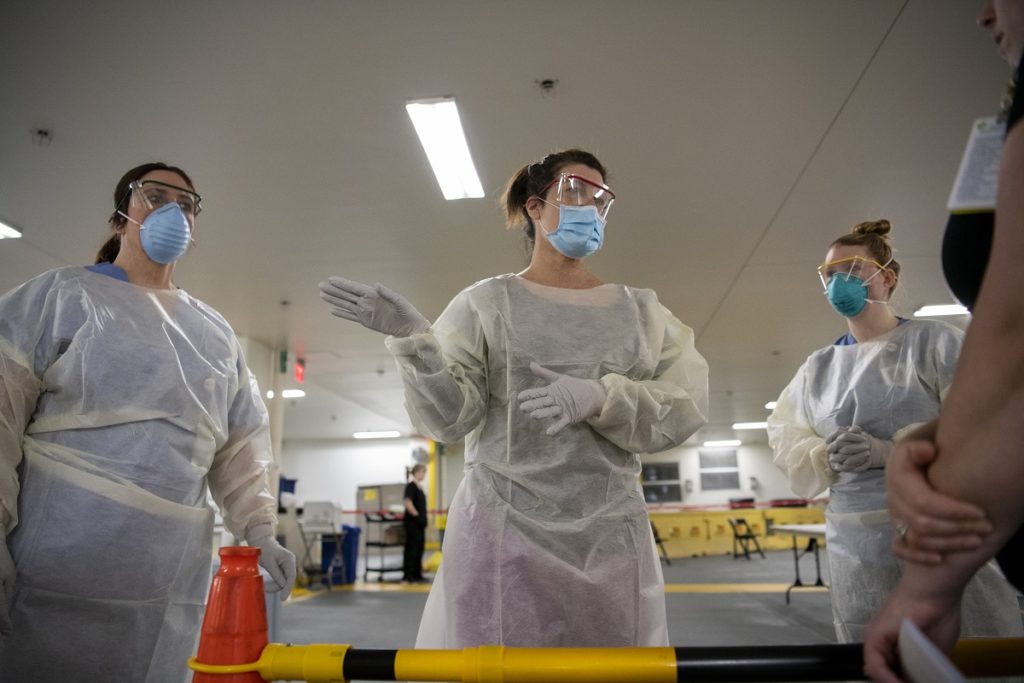When Shan Liu, MD, SD, goes to work as an emergency medicine physician in Massachusetts General Hospital’s Emergency Department, she is often protected by an N95 mask, a vital piece of personal protective equipment whose forerunner was created by her great grandfather, Dr. Wu Lien-teh. Here she shares how his legacy drives her in her work.
Who or what led you down the medical path?
The legacy and work of my great-grandfather — Dr. Wu Lien-teh — were at the core of the decision. Dr. Wu Lien-teh invented the first respirator N95-type mask during the 1910 Manchurian plague in China, when he was one of the first to suggest that the plague was transmitted via airborne bacteria. He advocated for quarantines and the use of protective measures like masking. Because of his efforts, the deadly plague ended after only four months.
I never considered doing anything other than becoming a physician and working in public health. I grew up hearing about my great-grandfather and his accomplishments from my parents, so he played a pivotal role in inspiring me to pursue medicine.
Like my great-grandfather, I am driven to protect the most vulnerable, which is why I pursued a career as an emergency medicine physician with an academic focus on geriatric patients. Working in this area, I strive to provide the best, most comprehensive care possible to older patients. I am working to improve protocols surrounding emergency response to falls, and to ensure that those experiencing loss of cognitive function and physical mobility are properly cared for in the emergency department during an ongoing capacity crisis.
In what ways did your great-grandfather’s legacy play a role in your work during COVID-19?
During the early months of the COVID-19 pandemic, when safety and prevention guidance were less than clear, I turned to my family in China for guidance. They had lived through SARS and were far more accustomed to pandemic protocols. They urged me to take every precaution I could, especially wearing an N95 mask. It was so amazing to realize that I was wearing and being protected by a respirator mask — something my great-grandfather invented 100 years ago. I felt so close to him and so inspired by his bravery in the face of a disease outbreak with a near 100% mortality rate.
 The Masked Hero: How Wu Lien-teh Invented the Mask that Ended an Epidemic
The Masked Hero: How Wu Lien-teh Invented the Mask that Ended an Epidemic
What was the impetus behind your children’s book, “The Masked Hero?”
My Asian American community experienced a drastic increase in hate and prejudice in 2020; horrific vitriol fueled by confusion, frustration and political tensions. I felt strongly about doing something to help contribute to positive Asian representation in the media and to instill pride in their heritage in my children. Inspired by one of my daughter’s school projects, I decided to turn my great-grandfather’s story into a children’s book, where an Asian character would be the hero. “The Masked Hero: How Wu Lien-teh Invented the Mask that Ended an Epidemic,” details the brave journey of my great-grandfather, illustrated as a superhero. I think many Asian Americans really struggled with the prejudice we were facing at that time, and it has meant a lot to my community to put forward some positive Asian representation in children’s media, where we aren’t often represented.
You mentioned the emergency medicine capacity crisis. How does that impact patient care delivery?
The boarding and overcrowding crisis in emergency medicine really impacts our ability to provide the best patient care that we can. Even as a resident many years ago, I noticed that I couldn’t provide my patients in the emergency department with the attention they deserved. It was difficult for me to find time to check back in while they awaiting admission, to administer second doses of antibiotics. For older patients, being alone in a noisy hallway, without family, can cause immense distress as well as delirium in dementia patients.
Where do you see potential for making positive change in this area?
One way I hope to make change in this area is by improving processes and protocols related to the older population, specifically when it comes to falling. We do a really good job of making sure they didn’t sustain an injury, but we aren’t doing enough to ensure they don’t fall again, and there’s a huge window of opportunity there to improve on evidence-based best practices. Falls in the older population are sentinel events — there’s a reason an older person might trip on a rug that’s been there for decades, whether it’s an infection or a decline in vision, balance, or muscle mass, and it’s important for us to fully understand the cause and see if there’s a pattern.
Telemedicine plays a role here. Bringing emergency responders directly to the home to prevent an older individual from having to come to the noisy and crowded emergency department, and improving communications practices across the hospital, are all ways that could help to improve the patient experience for this population.
What is needed to help make this happen?
Philanthropic funding could be incredibly impactful in helping us to alleviate these issues, especially for the aging population. Increased funding could help us to conduct research looking into who is truly the most susceptible to an adverse experience in the emergency department, how to prevent a return to the ED after a fall, and overall how we can change our protocols to better care for such vulnerable older folks.
To learn more about how you can support emergency medicine at Mass General, please contact us.

